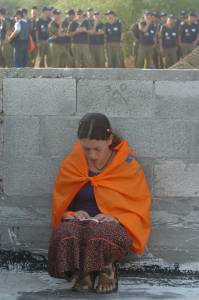This week in Israel’s history, a Jewish restaurant in Paris is attacked and the evacuation from Gaza begins.
August 9, 1982: Jewish Restaurant in Paris is Attacked by Palestinian Terrorist Group
An article in Businessweek in 2012 called it “the heaviest toll suffered by Jews in France since World War II”. On August 9, 1982, two terrorists belonging to the Abu Nidal terrorist organization, a militant splinter group from Fatah, attacked the Chez Jo Goldenberg restaurant in Paris’ Marais district.
The terrorists began the attack by throwing a grenade into the dining room and then in the chaos that ensued, rushed in and started firing machine guns.
Six people were killed, including two Americans and 22 others were injured.
It wasn’t until 32 years after the attack, in March 2015, that the terrorists were finally identified as members of the Abu Nidal group. Abu Nidal was the name of leader of the group.
Abu Nidal, born Sabri Khalil al-Banna, was the founder of the Fatah splinter group known as the Abu Nidal Organization (ANO). At the height of its power in the ’70s and ’80s, the ANO was widely regarded as the most ruthless of the Palestinian groups, being known for their random cruelty. The group’s name, Abu Nidal, means “father of struggle.”
August 15, 2005: Evacuation from Gaza Begins
On December 18, 2003, Israeli Prime Minister Ariel Sharon suggested a disengagement plan at the Fourth Herzliya conference. In his speech, he explained that settlements that would not be included in the State of Israel in any future final status permanent agreement with the Palestinians were to be relocated.

Young girl prays during the disengagement in Neve Dekalim. (Nati Shohat Flash90)
In spite of a public referendum on disengagement held on May 2, 2004 resulting in 65% of the voters being against disengagement, the government approved the plan. On February 16, 2005 the Knesset finalized it.
The primary focus of the disengagement plan, slated to be enacted in August 2005, was the eviction of all residents, demolition of residential buildings and evacuation of security personnel from the Gaza Strip. This was to be completed no later than September 12, 2005. The plan also included the eviction and dismantling of four settlements in Samaria, which was completed ten days later.
Originally the plan called for the eviction of Jewish residents from the Gaza settlements on August 14, but it turned out that August 14th was Tisha B’av – a day of mourning on the Jewish calendar marking the anniversary of the destruction of the two jewish Temples, as well as a host of other tragedies in Jewish history. So the operation was postponed until midnight between the 14th and the 15th and on the morning of the 15th the Army began handing out eviction notices to all residents who had not already vacated their homes.
The disengagement is considered by some in Israel to be the worst tragedy in the modern history of the Jewish state.
By: Penina Taylor, United with Israel
